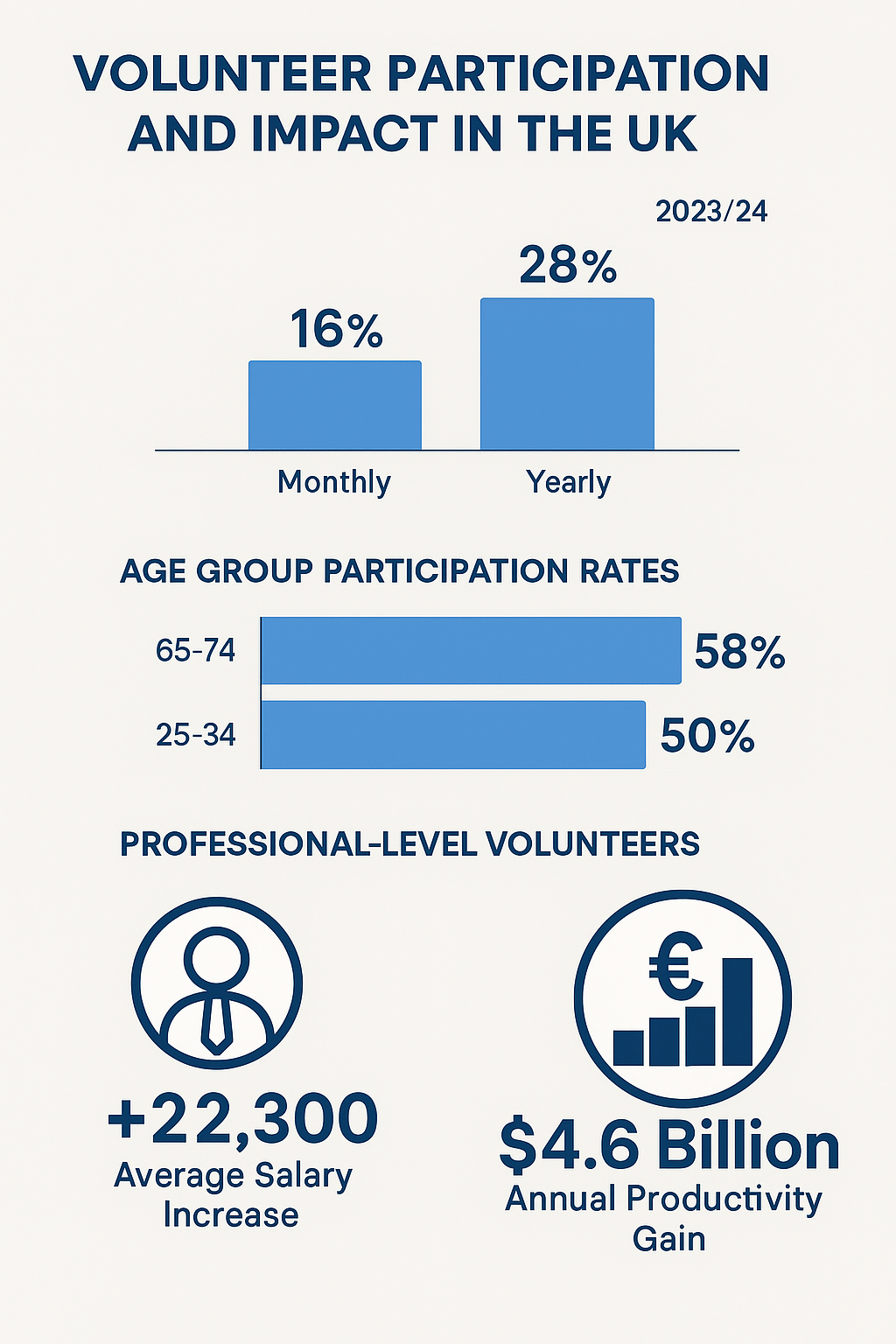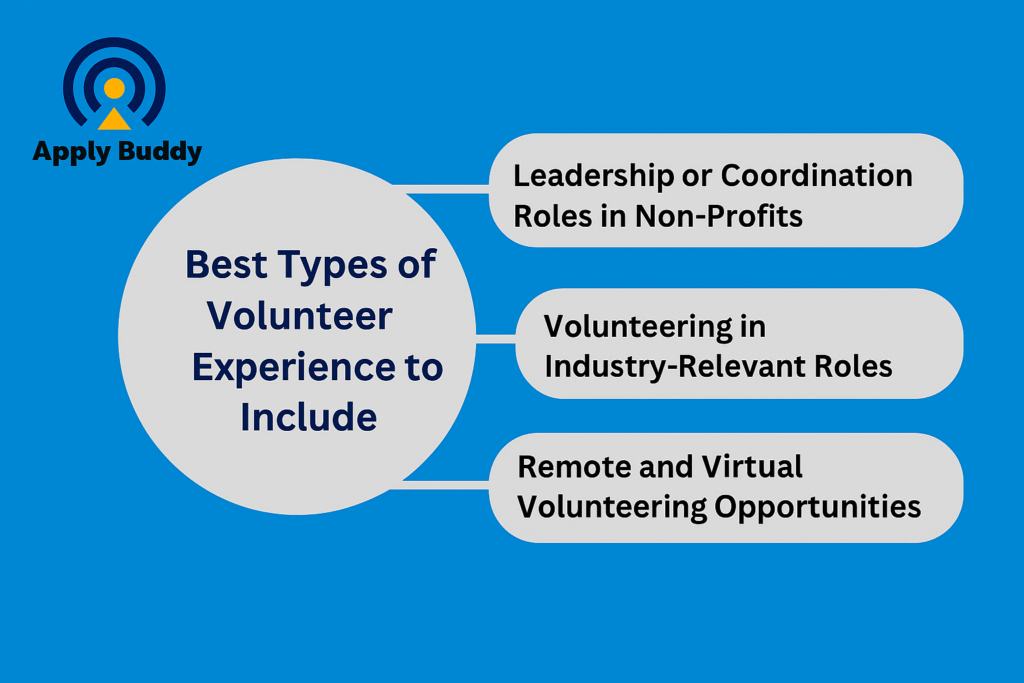So, you have volunteer experience to add to your CV. Brilliant. But how should you present it?
Volunteer experience on a CV is more than just extra activity, it shows your skills, reflects your values, and can even support a career change. Employers are interested in what you gained, not simply what you did. In today’s competitive job market, knowing how to write volunteer experience in CV format can be the difference between blending in and standing out.
For students, it provides a way to gain credibility and demonstrate readiness for the workplace. For professionals considering volunteering for career change, it bridges the gap between existing skills and new career paths. And for anyone focused on strengthening UK applications, it shows that you bring more than formal qualifications.
82% of hiring influencers said they are more likely to choose a candidate with volunteer experience on their résumé.
In this blog, we’ll explore how to highlight your volunteer work on a CV and make it count.
See Also:
- How to Write a CV That Gets Noticed by Recruiters
- How to Optimise Your CV to Get Interviews in the UK
Why Volunteer Work Matters on a CV
Adding volunteer experience to your CV does more than fill a gap, it highlights character, initiative, and practical skills that employers truly value. In today’s competitive job market, understanding how to write volunteer experience in CV format can be the difference between blending in and standing out.
For students, it provides a way to gain credibility and demonstrate readiness for the workplace. For professionals considering volunteering for career change, it bridges the gap between existing skills and new career paths. And for anyone focused on strengthening UK applications, it shows that you bring more than formal qualifications. You bring commitment, adaptability, and transferable skills that make you a stronger candidate.
How Volunteering Enhances Employability
Let’s face it: employers aren’t just hiring skills they’re hiring people. They want initiative, character, drive. Volunteering demonstrates all of this and more. You’re stepping up for something bigger than yourself, and that says a lot.
When you volunteer, especially in roles that require responsibility or leadership, you’re developing:
- Problem-solving abilities
- Time management
- Team collaboration
- Communication
- Creativity
- Emotional intelligence
In short, you’re doing real work just without a payslip. It proves you’re proactive, growth-oriented, and capable of contributing meaningfully to any team.
For example, someone who volunteered to manage logistics for a local community fundraiser is gaining similar experience to someone who coordinates corporate events. The context may differ, but the value and skills align perfectly.

Volunteering as a Bridge During Career Gaps
Had a career break? Maybe you stepped away for family, travel, or personal reasons. These breaks are natural, but many people worry about how they look on a CV.
Here’s the good news: volunteer experience on a CV can close that gap.
Instead of leaving an empty space, you can show that you stayed active. Even part-time volunteering reflects commitment, effort, and initiative. It proves that you kept learning, growing, and contributing during your break.
Recruiters value candidates who use time off wisely. By adding volunteering for career change or UK applications, you show that you stayed engaged, gained skills, and gave back. In simple terms, you’re saying: “I didn’t wait around. I used my time to build something valuable.”
Why Recruiters Value Volunteer Experience
Recruiters look beyond job titles. They want to see what you stand for and what unique skills you bring. This is where volunteering on your CV makes a big difference. It highlights not only what you’ve done but also who you are.
Here are four reasons recruiters value volunteer experience:
1. It Sets You Apart From Other Candidates
Many applicants may share the same degrees or certifications. Volunteer experience, however, shows extra initiative and depth. It differentiates you and makes your application more memorable.
2. It Shows Your Values and Work Ethic
Volunteer work tells employers that you are motivated by more than money. It shows commitment, responsibility, and the willingness to give your best qualities every organisation needs.
3. It Highlights Transferable Skills
Volunteering builds skills like teamwork, communication, leadership, and problem-solving. These transferable skills apply across industries and are especially powerful if you are volunteering for a career change.
4. It Demonstrates Initiative During Career Gaps
Recruiters respect candidates who use career breaks wisely. By volunteering, you prove that you stayed active, engaged, and ready to contribute, whether for local roles or volunteering in the UK job market.
Best Types of Volunteer Experience to Include
Best Types of Volunteer Experience to Include
Not all volunteer roles are created equal. Some align more directly with your career goals and demonstrate transferable skills from volunteering that can boost your professional profile.
When thinking about what to include, focus on the impact you made, not just your responsibilities. Whether it’s in-person work or virtual volunteering for professionals, employers want to see evidence of growth and initiative. You can even draw inspiration from a strong volunteer experience example CV to understand how others highlight results, improvements, and transformations no matter how small.
1. Leadership or Coordination Roles in Charities
These roles reflect responsibility, organisation, and communication all things employers value. Did you lead a team? Coordinate a project? Manage timelines or budgets? That’s leadership.
Example:
- Led a team to execute a local fundraising event, raising £5,000 for education programmes.
- Coordinated weekly meetings between volunteers and local government representatives.
- Spearheaded a donation campaign that increased outreach by 65% in under six months.
That’s not just volunteering. That’s project management, stakeholder engagement, and operations all rolled into one.
2. Volunteering in Industry-Relevant Roles
If you’re interested in marketing, volunteering to run a charity’s social media accounts is direct experience. Align your role with your field:
- Aspiring HR professional? Volunteer for community hiring drives.
- Future IT analyst? Support non-profits with digital setup or data entry.
- Budding graphic designer? Create flyers for local events.
This adds value to your CV and helps you discover which areas of your new industry you enjoy the most.
3. Remote and Virtual Volunteering Opportunities
Virtual volunteering for professionals is flexible, global, and still counts as valid experience. You can mentor students online, provide admin support to NGOs, design content, or run campaigns. This shows adaptability, digital skills, and independence.

How to Write Volunteer Experience on Your CV
Volunteer experience can be a powerful addition to your CV. It shows initiative, commitment, and the transferable skills that employers value when assessing candidates for new opportunities. The key is in how you present it. Format your volunteering history so it sits naturally alongside your paid roles, with clear descriptions of responsibilities and achievements. This way, it carries the same weight and impact as professional experience.
If you are applying for roles in the UK, it’s worth noting that many recruiters actively encourage candidates to include volunteering on their CVs. Doing so not only highlights your abilities but also reflects positively on your character and values. When aligned with your career goals, volunteer work becomes more than a footnote it positions you as a well-rounded and proactive applicant.
1. Correct Formatting for Volunteer Roles
Treat volunteer roles like any other work experience. That means:
Role Title – Organisation Name
Month Year – Month Year (or Present)
- Bullet points outlining responsibilities and achievements
Example:
Volunteer Project Coordinator – Shelter Support UK
June 2023 – Present
- Organised weekly donation drives, increasing public engagement by 60%
- Managed logistics for community outreach programmes
- Recruited and trained 15 new volunteers in health and safety procedures
If you’re submitting a chronological CV, list it among your other experiences in reverse-chronological order. On a skills-based CV, group it under a section titled “Relevant Experience” or “Volunteering.”
2. Using Action Verbs and Measurable Impact
Want to stand out?
Start with action verbs:
- Led
- Coordinated
- Organised
- Designed
- Created
- Researched
- Facilitated
- Trained
- Streamlined
Then quantify your results:
- “Designed a social media campaign that increased engagement by 45%.”
- “Trained 15 volunteers in safety procedures for community events.”
- “Organised monthly workshops attended by over 200 people.”
These details transform your volunteer role into a powerful narrative.
Where to Place Volunteer Work on Your CV
How you format volunteer work on your CV depends on how relevant it is to the role you’re applying for.
- If the volunteer role is highly relevant, include it in your Work Experience section so it carries the same weight as paid roles.
- If it’s complementary, create a separate Volunteer Experience or Additional Experience section to showcase it clearly.
- For career changers, volunteering can even take the lead on your CV, especially if it highlights the skills most aligned with your new career path.
When presented thoughtfully, volunteer experience does more than fill space it strengthens your profile, demonstrates initiative, and shows recruiters that you bring value beyond traditional employment.
See Also:

When to Highlight Volunteering Over Paid Roles
Sometimes unpaid work can say more about your abilities than a paid role. If your volunteering matches the job better than your current role, give it more space on your CV.
For career changers, this can be a real advantage. Volunteering lets you show skills that transfer directly into a new industry, proving you have more than just interest you have experience.
If your volunteering involved leadership, project work, or technical skills, highlight it. These are often the same qualities employers look for in paid staff.
Finally, if your volunteering shows passion for the field or supports your career goals, move it up. A well-placed volunteer role can show dedication, adaptability, and initiative qualities that can outweigh routine tasks in past jobs.
For Career Changers Entering New Fields
Volunteering for career change is one of the most strategic things you can do. Building strong Volunteer Experience to Add to Your CV not only helps you gain practical skills but also demonstrates initiative.
Trying to pivot from finance to education? Volunteering to tutor students shows direct involvement. That’s something employers love to see you’re not waiting around, you’re already putting yourself in the field.
Likewise, an IT professional looking to enter healthcare might volunteer for a hospital charity and support their internal systems. This kind of Volunteer Experience to Add to Your CV is relevant, insightful, and tells a great story.
See Also:
1. As Evidence of Transferable Skills
Can’t match every job requirement line-for-line? No problem.
Use transferable skills from volunteering to showcase:
- Leadership
- Communication
- Planning
- Customer service
- Digital literacy
- Multitasking
- Problem-solving
A role organising local events can display the same skills needed to manage corporate projects. It’s all about the value you created and the soft skills you used.
2. To Show Continuous Professional Development
Even if you’re between roles, volunteering demonstrates that you’re still growing.
It tells hiring managers: “I stay engaged, I contribute, I learn.”
In a competitive job market, that kind of initiative sets you apart. It’s a subtle but powerful way to say: “I never stopped improving.
Stand Out and Get Noticed With Apply Buddy
With 82% of hiring decision-makers preferring candidates who have volunteered, your experience could be the deciding factor.
Applybuddy’s CV Optimization Packages help present your volunteer achievements in ways that pass applicant tracking systems and impress recruiters. Transform your dedication into career momentum and make every line on your CV work harder for you.

FAQs
1. Can I list unpaid volunteer work as professional experience?
Yes! As long as it reflects real responsibilities and outcomes, unpaid work counts. Format it just like paid roles. The key is to demonstrate impact and relevance.
2. What skills can I highlight from volunteering on a CV?
Plenty! Some include:
- Public speaking
- Fundraising
- Team leadership
- Content creation
- Event planning
- Budgeting
- Conflict resolution
- Mentorship
- Social media management
Tailor these to the job you’re applying for. Match them to the keywords in the job description.
3. Does volunteer experience count for entry-level job applications?
Absolutely. If you’re starting out, volunteering can sometimes outweigh limited work experience. Recruiters love seeing active initiative. It tells them you’re willing to work hard and get involved, even when money isn’t the reward.
4. How do employers verify my volunteer experience?
Usually through references. Stay in contact with volunteer supervisors and keep records of your contributions. LinkedIn recommendations can also support your claims.
If you have any certificates or written acknowledgements of your involvement, keep them safe—they can boost your credibility.
Final Thoughts
Including volunteer experience on your CV isn’t just a way to fill space it’s a smart career strategy.
Whether you’re changing careers, returning to the workforce, or simply want to stand out, well-formatted and relevant volunteer work can position you as a proactive, capable, and well-rounded professional.
So go ahead and include volunteering on your resume, UK job seekers. It might just be the edge you need.
